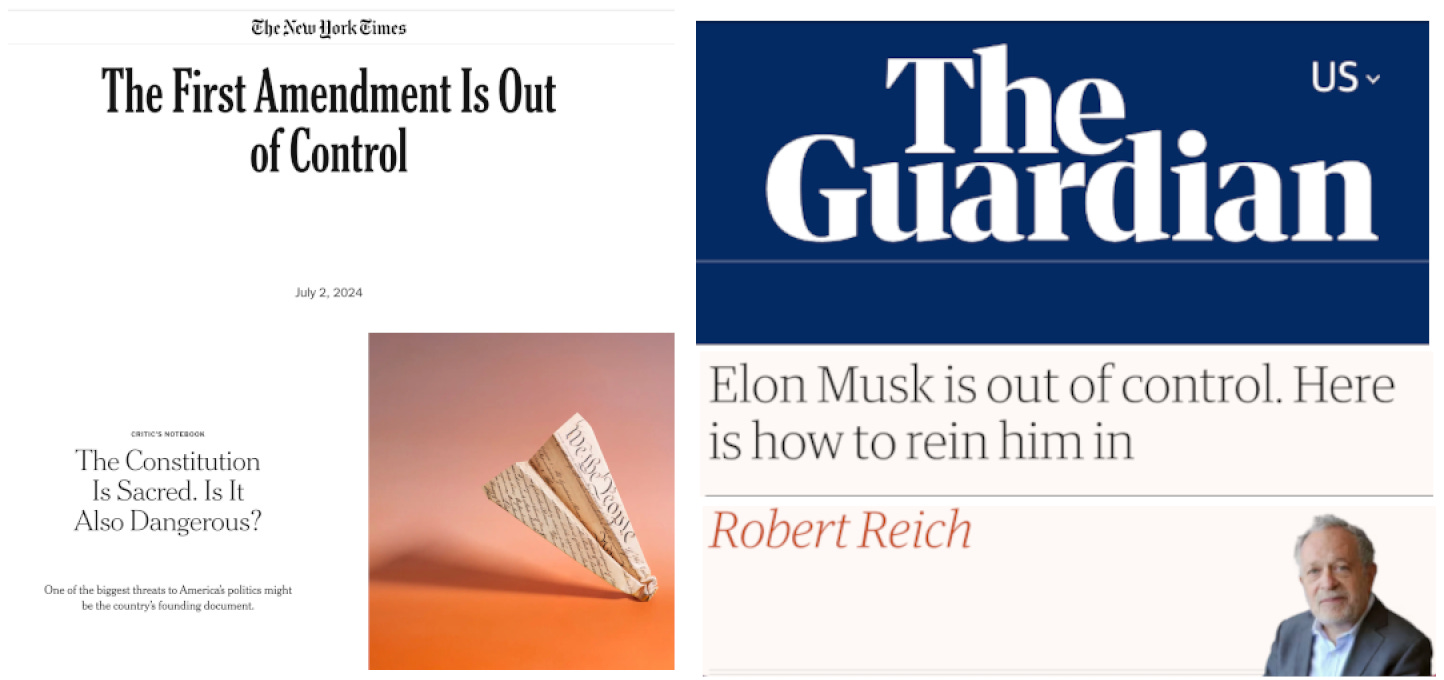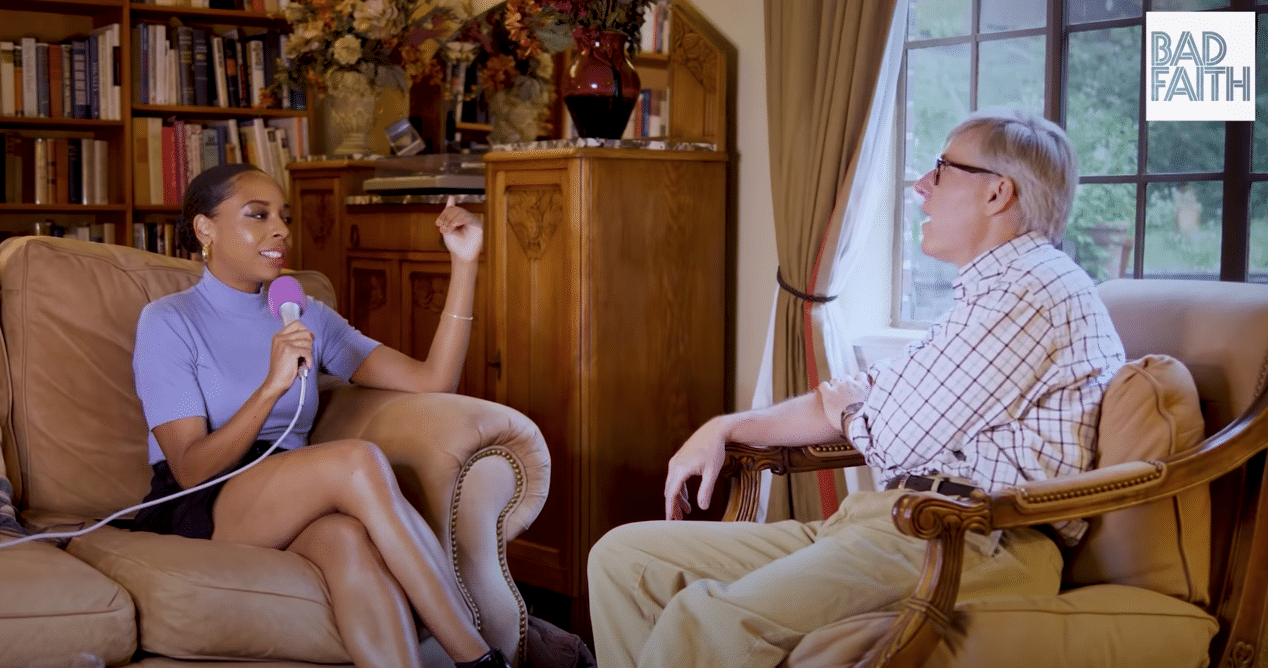

Liberalism Removes its Mask
by Matt Taibbi | Sep 2, 2024
In the Washington Post today, under the headline, “Musk and Durov are facing the revenge of the regulators”:
While freewheeling internet companies have long clashed with authoritarian regimes — Google in China, Facebook in Russia or pre-Musk Twitter in Turkey — Western governments until recently generally did not regard social media and the vision of free speech they promoted as being fundamentally at odds with democracy… Banning entire social networks or arresting their executives simply wasn’t something liberal democracies did… Now, for better or worse, it is.
Columnist Will Oremus noted that although the Durov and Musk cases differ, both “involve democratic governments losing patience with cyberlibertarian tech moguls” who “thumbed their noses at authorities.” He highlighted a “vibe shift,” noting that “high-flying tech leaders will have to think a bit more carefully” about “whose soil they’re on when they step off a plane.”
American liberalism railed against Bush conservatives who said those who didn’t break the law had nothing to hide. Now, once-liberal voices are tripping over each other to make more extreme versions of the same argument. Former Labor Secretary Robert Reich published a guide to how to “rein in” Elon Musk in The Guardian that includes a recommendation that “regulators around the world should threaten Musk with arrest,” adding cheerfully that “global regulators may be on the way to doing this, as evidenced by the 24 August arrest in France of Pavel Durov.” Following up its July article about how “The First Amendment is Out of Control,” the New York Times also has a piece titled, “The Constitution is Sacred. Is it Also Dangerous?”

My old employers at Rolling Stone described defenders of Durov as “far-right extremists” and Musk as a “grandstanding” charlatan seeking to evade “consequences.” All this is in line with views of Kamala Harris, who’s argued that “there has to be a responsibility that is placed” on social media sites to prevent misuse of speech “privileges.” The Harris take previewed the complaint this year by Justice Ketanji Brown Jackson that the First Amendment was “hamstringing the government,” despite this being its purpose.
“My biggest concern is that your view has the First Amendment hamstringing the government in significant ways.”
Supreme Court Justice Ketanji Brown Jackson's remarks in Murthy vs. Missouri are some of the most chilling ever to be uttered in the court.
KBJ's pro-authoritarian… pic.twitter.com/ZsmHeRm4Y2
— Kyle Becker (@kylenabecker) August 28, 2024
There’s no “vibe shift.” Having written bestselling books on criminal justice for blue-leaning audiences, I can attest: American liberalism’s trumpeting of “rights” always stopped at the border of whatever tony suburb or upscale city neighborhood it inhabited. While public defenders fought rights violations at peasant wages, wealthy Democrats in the privacy of voting booths always voted in the truncheon, lapping even law-and-order Republicans in aristocratic disgust of the rabble. As podcast partner Walter Kirn put it, the mask is off:
A dozen years ago, I covered court proceedings involving a pair of fortysomething black men named Anthony Odom and Michael McMichael. The pair were ex-cons, long retired from the drug game, who’d been stopped in the Bronx, yanked out of a Range Rover, thrown in a van, and hauled to jail because an undercover cop on foot claimed to smell weed through closed windows as they drove by in winter. Were they questioned? “You clearly don’t know the New York City police,” Anthony said. “They don’t be asking you anything.”
Finding no drugs, prosecutors offered generous deals. What about a guilty plea and a twenty-five dollar fine? No? How about community service? (“It’s just two hours!” a prosecutor pleaded.) Only after a year of both men saying no did the city to drop the case, which I was following after running into a series of these “thrown in a van” stories while writing The Divide. They were part of a “fishing with dynamite” enforcement strategy that forced beat cops to satisfy huge arrest and summons quotas laid down by stats-obsessed captains and commissioners. (“We need three more,” McMichael and Odom heard over the police radio.)
How city politics work: rich developers get Mayors elected, Mayors use police to keep developers happy. “Community policing” strategies used to round up McMichael and Odom were part of a statistical dragnet rich New Yorkers repeatedly endorsed. The developer-pol relationship was a subtext to the death of Eric Garner, who dressed in rags and at 350 pounds drew complaints from builders of fancy condos across the street from Garner’s Staten Island corner. On the day Garner was killed, a lieutenant from the 120th precinct saw Garner as he drove past, remembered complaints, and dispatched detectives to move him off the corner. They ended up killing him instead.
This kind of police murder was actually rare. What was and is common is use of draconian methods to harass people on borders of rich and poor neighborhoods. The stats era saw cops staking out parked bicycles so they could hand out summonses for riding on sidewalks, or seizing cash in stop-and-frisk searches before telling citizens they could bring in pay slips to get it back. Undercovers were dispatched on buses to homeless shelters to catch homeless fare-beaters, and huge quantities of arrests and tickets were issued for offenses like loitering and “obstructing pedestrian traffic.”
Those tactics were born in the court of famed liberal Justice Earl Warren, who at the end of his career chafed at criticism he’d “coddled criminals.” His opinion in Ohio v. Terry, which legalized stop-and-frisk, read like an apologetic walk-back of ideals, worrying that a “rigid” application of his exclusionary rule barring illegal searches may extract a “high toll” in “frustration of efforts to prevent crime.” Terry threw police a bone. Years later, former Boston, New York, and Los Angeles police Commissioner William Bratton used that precedent to turn urban policing into a volume game, where young black men got put “against the wall” while residents in the West Village or Upper East side hardly saw police (or young black men, for that matter).
These strategies were often described as “experiments,” which is what America’s cities are: giant labs for testing dystopian police methods. The core recent innovation is aggressive enforcement of minor offenses like disorderly conduct, so pretty much anyone can be arrested, anytime. A little-discussed part of the experiment? Virtually all the cities are one-party states. The politicians are nearly always Democrats, and the biggest whip-crackers are more typically people like Baltimore Democrat Martin O’Malley than interlopers like Rudy Giuliani.
I was always confused by young white activists holding up signs protesting police GENOCIDE. Again, murders of unarmed men were relatively rare. The true outrage was in the stops, harassment, and worst of all, the political monopolies in cities that made it impossible to fix solvable problems like the rooting out of bad officers, or COMPSTAT-type programs that pre-mandated tickets and arrests. This out-of-sight, out-of-mind policing program was a product of the weird paternalistic bigotry of America’s intellectual class, which wants to appear enlightened while avoiding contact with minorities. By the end of I Can’t Breathe I came to believe the extraordinary willingness to support Constitution-flouting enforcement tactics was rooted in a psychological need of rich voters to avoid facing their own racial views, while keeping working-class cops the symbols of racism.
It was big news in June of 2016 when Reuters published a poll showing that 32% of Trump supporters believed blacks were less “intelligent” than whites. The fact that 22% of Clinton supporters said the same thing got less ink. Since 2016 a lot changed, but the more infantalizing version of racism made popular by text-borrowing dingbat Robin DiAngelo became chic after the murder of George Floyd. Academics argue that black people are so historically damaged that they now need far more than equal opportunity, and health authorities regularly trumpet an idea I first saw expressed in the Obama years: that “belief in meritocratic ideology may be detrimental to African American health.”
Another change? The experiment with two-tiered justice moved outside cities. Bill Bratton is now co-chair of the Homeland Security Advisory Council, the folks asserting that your “cognitive infrastructure” is a policeable space. You can read the HSAC’s recommendations on “Disinformation Best Practices” here. Rich urbanites didn’t want to hear about all those poor people they voted to stop, frisk, ticket, strip-search en masse, arrest on bullshit crimes, and send north to all those prisons built by Mario Cuomo. But they’ll gush over prosecutions of J6 protesters, surveillance of “DVEs” and terrifying aviation threats like Tulsi Gabbard, and censorship of “far-right” Internet users who spread “disinformation” or disobey federal lockdown or vaccine policies.
This is all freeing for white liberals. In the age of Trump, there’s no longer need to pretend to care about people on the business end of unconstitutional crackdowns, who can and must be painted as deserving all of upscale America’s most aggressive enforcement plans.
In fact, as columns like Reich’s show, they can barely restrain their glee at using institutional power to go after unwelcome visitors to what they consider their political neighborhood, i.e. earth. They’ll keep painting shutdowns and arrests as blows against “unaccountable” billionaires, but make no mistake, the real targets of their anger are the millions of ordinary slobs refusing their advice and calling them names online. In cities they arranged it so the riff-raff were neither seen nor heard (and those who disobeyed went upstate, fast). Until they get the same service everywhere else, well, aristocrats gonna aristocrat. They just don’t feel like hiding it anymore.





0 Comments